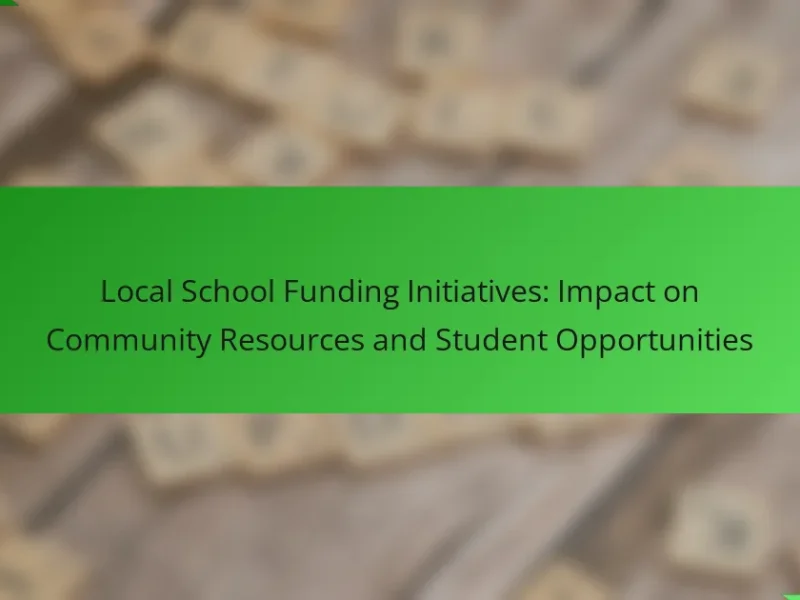After-school programs are structured activities designed to support children’s academic, social, and recreational needs after the school day. These programs encompass a variety of options, including tutoring, sports, and arts, and serve over 10 million children in the United States. The article outlines the benefits of after-school programs, such as improved student performance and engagement, while also addressing the enrollment process for parents. Additionally, it highlights common challenges faced by these programs, including funding limitations, staffing issues, and accessibility barriers that can affect participation, particularly for low-income families.

What are After-School Programs?
After-school programs are structured activities that occur after the school day ends. They provide children with opportunities for academic support, enrichment, and social interaction. These programs can include tutoring, sports, arts, and various recreational activities. According to the Afterschool Alliance, over 10 million children participate in after-school programs in the United States. These programs help improve student performance and foster a safe environment. Research indicates that students involved in after-school programs show better school attendance and engagement.
How do After-School Programs function?
After-school programs provide structured activities for children outside regular school hours. They typically operate in schools, community centers, or dedicated facilities. These programs offer homework assistance, recreational activities, and enrichment opportunities. Staff members often include teachers, volunteers, or trained professionals. Programs may focus on academic support, arts, sports, or life skills. Participation can be voluntary or required for some students. Funding sources may include grants, tuition fees, or community donations. Studies show that after-school programs can improve academic performance and social skills.
What activities are typically included in After-School Programs?
After-school programs typically include a variety of activities designed to engage students. Common activities are homework help and tutoring sessions. Many programs offer arts and crafts to foster creativity. Sports and physical activities are also prevalent, promoting fitness and teamwork. Additionally, educational enrichment activities, such as science experiments or reading clubs, are often included. Social skills development through group games is another key component. These activities aim to support academic growth and personal development. Research indicates that structured after-school activities can improve student outcomes (Afterschool Alliance, 2020).
How do After-School Programs address different age groups?
After-school programs address different age groups by tailoring activities to the developmental needs of each group. For younger children, programs often focus on play-based learning and social skills. These activities help foster creativity and teamwork. For middle school students, programs typically emphasize academic support and enrichment. This may include homework help and STEM activities. High school students often benefit from programs that offer life skills training and career exploration. Research shows that age-appropriate programming increases engagement and participation. Programs that adapt to age-specific interests and abilities can significantly improve outcomes for participants.
What are the types of After-School Programs available?
The types of after-school programs available include academic enrichment programs, sports and recreation programs, arts and culture programs, and mentoring programs. Academic enrichment programs focus on tutoring and homework assistance. Sports and recreation programs provide physical activities and team sports. Arts and culture programs encourage creativity through visual arts, music, and drama. Mentoring programs pair students with [censured] mentors for guidance and support. Each program type addresses different interests and developmental needs of students.
What are the main categories of After-School Programs?
The main categories of after-school programs include academic enrichment, arts and culture, sports and recreation, and social-emotional learning. Academic enrichment programs focus on tutoring and homework assistance to improve student performance. Arts and culture programs offer activities like music, dance, and visual arts to foster creativity. Sports and recreation programs provide physical activities and team sports to promote fitness and teamwork. Social-emotional learning programs aim to develop interpersonal skills and emotional intelligence among students. Each category serves distinct needs and interests, enhancing the overall development of children.
How do academic-focused After-School Programs differ from recreational ones?
Academic-focused after-school programs prioritize educational enrichment and skill development. They typically include tutoring, homework assistance, and structured learning activities. These programs aim to improve academic performance and support school curricula. In contrast, recreational after-school programs emphasize physical activity, creativity, and social interaction. They often feature sports, arts and crafts, and games. The main goal of recreational programs is to provide a fun and engaging environment. Research indicates that academic programs can lead to improved grades and test scores, while recreational programs enhance social skills and physical health. Both types serve important roles but cater to different student needs.
What benefits do After-School Programs provide?
After-school programs provide various benefits, including improved academic performance and social skills. These programs offer structured activities that help children complete homework and enhance learning. Research indicates that students in after-school programs show better grades and test scores. Additionally, they foster social interaction, allowing children to develop friendships and teamwork skills. Participation in these programs can also reduce behavioral issues and increase self-esteem. According to the Afterschool Alliance, 70% of parents believe after-school programs are vital for their children’s success. Overall, after-school programs contribute positively to children’s development and well-being.
How do After-School Programs support academic achievement?
After-school programs support academic achievement by providing additional learning opportunities outside regular school hours. They offer tutoring, homework assistance, and enrichment activities that reinforce classroom learning. Research indicates that students participating in these programs show improved grades and test scores. A study by the Wallace Foundation found that after-school programs can lead to higher academic performance and better school attendance. These programs also foster a supportive environment that encourages engagement and motivation in students. By addressing educational gaps, they help enhance overall academic outcomes.
What social skills can children develop through After-School Programs?
Children can develop various social skills through After-School Programs. These programs often encourage teamwork, allowing children to collaborate on projects. This collaboration fosters communication skills as they express ideas and listen to others. Conflict resolution skills are also enhanced as children navigate disagreements in a structured environment. Additionally, children learn empathy by interacting with peers from diverse backgrounds. Leadership skills can emerge as they take on roles in group activities. After-School Programs provide opportunities for making new friends, which improves social networking abilities. Research indicates that participation in such programs can lead to improved social interactions and emotional regulation. These benefits contribute to overall personal development in children.

How can parents enroll their children in After-School Programs?
Parents can enroll their children in after-school programs by following specific steps. First, they should research available programs in their area. This includes checking local schools, community centers, and online resources. Next, parents need to review the program details, such as schedules, activities, and fees. After choosing a suitable program, they should contact the program coordinator for enrollment procedures. Many programs require filling out an application form and may request additional documentation. Parents should also inquire about deadlines for enrollment. Finally, they must ensure payment is completed to secure their child’s spot. Programs often have limited capacity, making timely enrollment crucial.
What is the enrollment process for After-School Programs?
The enrollment process for After-School Programs typically involves several key steps. First, parents or guardians must identify a suitable program. This can be done through school recommendations or community resources. Next, they need to complete an application form. This form usually requires basic information about the child and the family.
After submitting the application, parents may need to attend an orientation session. This session provides important information about the program’s policies and procedures. Some programs may also require a registration fee at this stage.
Once the application is processed, families will receive notification of acceptance. This notification may include further instructions regarding attendance and necessary supplies. Finally, parents should confirm their child’s enrollment by following any additional steps outlined by the program.
What information is required for enrollment in After-School Programs?
Enrollment in After-School Programs typically requires personal information about the child. This includes the child’s name, age, and grade level. Additionally, parents or guardians must provide contact information. Emergency contact details are also necessary. Health information, such as allergies or medical conditions, is often required. Some programs may ask for previous school records or recommendations. Proof of residency might be needed in certain cases. Each program may have specific requirements, so it is essential to check with the individual program for exact details.
How can parents find After-School Programs in their area?
Parents can find after-school programs in their area by utilizing local resources. They should start by checking school district websites for program listings. Community centers often provide information about available programs. Local libraries may also have resources or flyers about after-school activities. Parents can search online directories that specialize in after-school programs. Social media groups for local parents can be helpful for recommendations. Additionally, word-of-mouth from other parents can lead to valuable insights. Research shows that 70% of parents rely on community recommendations when selecting after-school programs.
What factors should parents consider when choosing an After-School Program?
Parents should consider the program’s safety and supervision. Ensuring a secure environment is crucial for children’s well-being. They should also evaluate the program’s curriculum and activities. Engaging and educational content is important for child development.
Staff qualifications and experience are key factors as well. Trained personnel can provide better support and guidance. Parents should assess the program’s location and transportation options. Proximity to home or school can ease logistics.
Cost is another significant consideration. Programs should fit within the family’s budget while offering value. Flexibility in scheduling can also be important for working parents. Programs that accommodate varying needs can enhance convenience.
Finally, parent reviews and testimonials can provide valuable insights. Feedback from other families can help gauge the program’s effectiveness.
How do program costs influence the selection of After-School Programs?
Program costs significantly influence the selection of After-School Programs. Families often prioritize affordability when choosing programs for their children. Higher costs can limit access for low-income families. Conversely, lower-cost programs may attract a larger number of participants. Research indicates that 70% of families consider cost as a primary factor in their decision-making process. Additionally, program costs can affect the quality and range of activities offered. Programs with higher funding may provide better resources and staff training. Ultimately, cost is a critical determinant in program selection and accessibility.
What safety measures should be evaluated in After-School Programs?
Safety measures in After-School Programs include staff background checks, emergency procedures, and supervision ratios. Background checks ensure that all staff members do not have a history that could endanger children. Emergency procedures should be clearly defined and practiced regularly. Supervision ratios must comply with state regulations to ensure adequate [censured] oversight. First aid training for staff is crucial to respond effectively in emergencies. Safety protocols should also include secure access to facilities to prevent unauthorized entry. Regular safety drills can prepare students and staff for potential emergencies. Finally, communication plans with parents about safety policies enhance trust and transparency.

What are the common challenges associated with After-School Programs?
Common challenges associated with After-School Programs include funding limitations, staffing issues, and program accessibility. Funding limitations often hinder the ability to provide quality resources and materials. Many programs struggle to secure consistent financial support, impacting their sustainability. Staffing issues arise from a lack of qualified personnel, leading to high turnover rates. Programs may also face difficulties in recruiting and retaining staff who are adequately trained. Accessibility challenges can limit participation for low-income families. Transportation barriers often prevent children from attending, especially in underserved areas. Additionally, some programs may not cater to diverse needs, such as language or special education requirements. These challenges can ultimately affect the effectiveness and reach of After-School Programs.
How can parents address potential issues in After-School Programs?
Parents can address potential issues in after-school programs by maintaining open communication with program staff. Regularly discussing concerns can help identify problems early. Parents should also observe their child’s behavior and engagement in the program. Noticing signs of distress or disinterest can prompt timely action. Additionally, parents can participate in program meetings or events. This involvement fosters relationships and provides insight into program operations. Seeking feedback from other parents can also be beneficial. Collective experiences may highlight common issues and solutions. Lastly, parents can advocate for changes if necessary. Documenting specific concerns can strengthen their case when addressing issues with program administrators.
What strategies can be used to enhance a child’s experience in After-School Programs?
Engaging children in After-School Programs can be enhanced through various strategies. Incorporating interactive activities fosters participation and enjoyment. Providing a diverse range of programs caters to different interests and skills. Regular feedback from children helps tailor experiences to their preferences. Training staff in child development improves interactions and support. Establishing a welcoming environment encourages comfort and expression. Parent involvement strengthens community ties and enhances program effectiveness. Research shows that active participation increases satisfaction and retention in after-school settings.
What tips can help ensure a successful After-School Program experience?
Establish clear communication with parents and guardians. This ensures everyone is informed about the program’s goals and activities. Create a structured schedule for activities. A well-organized timetable helps participants know what to expect. Foster a positive environment for all students. Encouraging inclusivity enhances social interactions and engagement. Offer diverse activities that cater to various interests. This approach keeps students motivated and excited to participate. Regularly assess the program’s effectiveness through feedback. Gathering input helps identify areas for improvement and success. Engage trained staff who can facilitate activities effectively. Skilled leaders enhance the overall experience for participants.
After-school programs are structured activities designed to provide children with academic support, enrichment, and social interaction beyond regular school hours. This article covers the various types of after-school programs, including academic enrichment, sports, arts, and mentoring, while highlighting their benefits such as improved academic performance and social skills development. It also outlines the enrollment process for parents, factors to consider when selecting a program, and common challenges faced by these programs. Key aspects include safety measures, program costs, and strategies to enhance children’s experiences in after-school settings.


